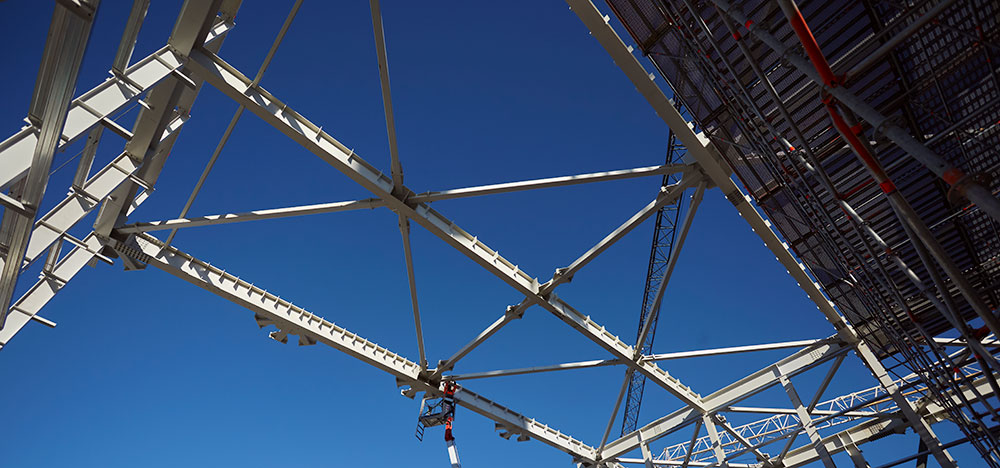Framework
Our framework incorporates our vision, goals, focus areas, enablers and priorities, as well as how the sector will work together to deliver the Transformation Plan 2022-2025 and measure its progress.
On this page

The Accord's vision
A thriving, fair and sustainable construction sector for a better Aotearoa New Zealand.
The Accord's mid-term goals
- Increased capabilities of leaders to drive change - Sector transformation requires leaders with the capability to lead their organisations towards better performance and increased resilience to cope with external and internal forces.
- A more skilled and diverse workforce that is future ready - The workforce needs to be able to deliver the work today and into the future. This will require both new capabilities and increased size in critical areas.
- More thriving people and organisations – The sector is thriving when it shows sustainable growth where organisations and people can be successful in achieving their unique goals and ambitions.
- Greater Māori construction economy success - Enabling greater prosperity and mana for Māori individuals and organisations will help better quality broader outcomes that will flow intergenerationally to tangata whenua.
- Reduced waste and embodied and operational carbon - In line with Aotearoa New Zealand's environmental commitments, waste and carbon must be reduced in the sector.
- Increased productivity through innovation, technology, and an enabling regulatory environment - Lifting productivity will require public and private organisations of all sizes to adopt new practices, tools and products that can only be achieved through innovation, ranging from incremental to disruptive.
The Accord's focus areas, enablers and priorities
This plan contains 11 priorities that sit within five focus areas and two enablers.
We will focus the majority of our effort and resources on the transformational focus areas - People, Client Leadership, Environment and Innovation - while reserving some of our capacity to respond to emerging issues and opportunities.
Our work will be enabled by improving our knowledge through the use of data and information for sound decision-making and creating powerful networks of like-minded people across the sector.
People
1. Leadership for change: To build the capabilities and capacities of large and small and medium sized enterprise (SME) leaders to lead business improvement and change.
2. Workforce development: To support the development, attraction, and retention of the workforce of tomorrow.
3. Strong Māori construction economy: To authentically partner, recognising the important relationship with Māori in Aotearoa.
4. Wellbeing, health and safety for all people: To enable thriving people at all levels and continued focus on a zero-harm and fatality-free sector.
Client Leadership
5. Procurement and contracting: To drive better outcomes through improved planning, procurement and delivery practices achieved through more collaborative behaviours.
Environment
6. Environmental and climate action: To accelerate the adoption of carbon and waste minimising materials and practices.
Innovation
7. Advanced construction ecosystem: To accelerate innovation ranging from incremental business performance improvement to disruption and value creation.
Emerging Issues and Opportunities
8. Response to emerging issues and opportunities: To bring the sector industry and government together to navigate and manage emerging issues and opportunities in order to create space for transformation.
Knowledge
9. Beacons: To shine a light on new and innovative approaches that put the Accord’s principles into action and inspire others to embrace change.
10. Data, information and insights to assist decision-making: To enable the use of data and information for sound decision-making across the sector and to steer the work of the Accord.
Networks
11. Creating and leading networks: To convene peer networks, advisory groups and platforms that enable sharing, learning and alignment.
How the Accord will act
To achieve our goals for the sector, the Accord will deliver the plan’s initiatives and priorities in several different ways, including:
- Accelerating: Identify and support the innovators who can deliver disruptive and transformative change
- Creating: Deliver initiatives that fill gaps in the sector that prevent progress, for example by developing guidance, procurement mechanisms, or business support tools
- Sharing: Gather data and stories to help others learn and make better decisions
- Influencing: Use partnerships and relationships to influence change and improve behaviours that are in line with the Accord's principles
- Funding: Use our budget to fund the development and delivery of initiatives that can help achieve the Accord's goals.
Use of partnerships
The Accord will work with key partners to support the delivery of this plan. Accord partners share a common purpose and work together to achieve shared outcomes. As partners, we recognise the value in each other and that one organisation alone cannot tackle an issue that sits across organisational boundaries. The Accord will work closely with partners and sector stakeholders to scope out the initiatives and to identify the best way to achieve our shared outcomes.
Measurement approach
A developmental evaluation approach will be applied to assess change over time. A range of measures will be reviewed to understand the plan's progress, and progress will be monitored and evaluated at both a programme level and an individual initiative level.
The Transformation Plan 2022-2025's mid-term goals will be the basis of a measurement approach that will give greater confidence and evidenced-based direction to the Accord’s activities. The measurement approach will allow the Accord to continuously monitor initiatives to assess and improve the effectiveness of the Accord's actions. Example measures for each goal are as follows:
| Mid-term goals | Example Measures |
|---|---|
| 1. Increased capabilities of leaders to drive change |
|
| 2. A more skilled and diverse workforce that is future ready |
|
| 3. More thriving people and organisations |
|
| 4. Greater Māori construction economy success |
|
| 5. Reduced waste and embodied and operational carbon |
|
| 6. Increased productivity through innovation, technology, and an enabling regulatory environment |
|



